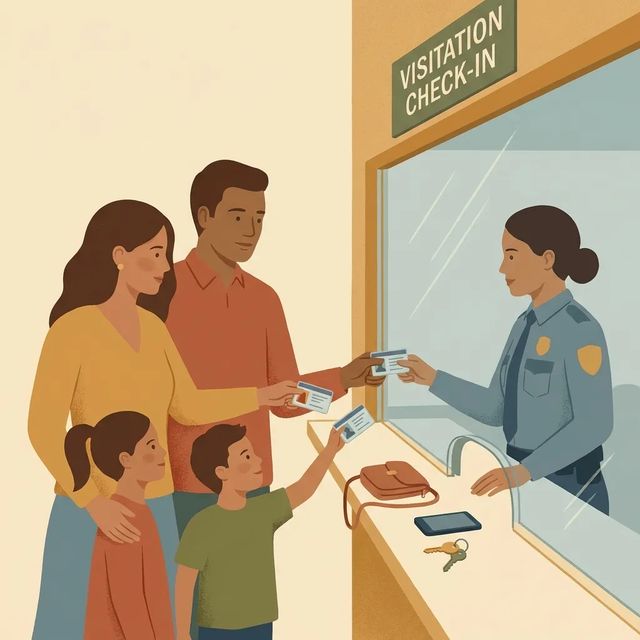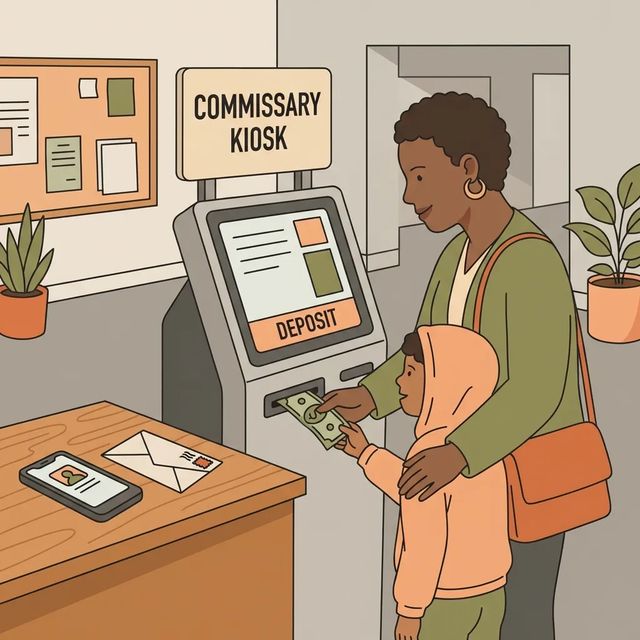Anderson County Jail
Explore
Find an Inmate at Anderson County Jail
Search for a loved one and send messages and photos in minutes.

Guides for This Facility

How to Schedule and Prepare for Your First Visit at Anderson County Jail
Visiting someone at Anderson County Jail is straightforward once you know what trips people up: you must schedule online ahead of time and show up early with the right ID. This guide covers scheduling, check-in, visitor limits, and the rules that can end a visit fast.
Read Guide
Putting Money on an Inmate's Account at Anderson County Jail: Complete Guide
Adding money to someone's account at Anderson County Jail is simple once you know the approved methods—and the one weekly deadline that matters for commissary.
Read Guide
Anderson County Jail's Mail Processing: Why Your Letter Goes to Longview First
Mailing a letter to someone at Anderson County Jail? You might notice a Longview address—even though your loved one isn't housed there. That's because the jail uses centralized mail processing. All inmate mail (except legal and medical) goes to PO Box 591, Longview, TX 75606, where it's scanned and delivered electronically.
Read GuideAt a Glance
Visitation
- Visits must be scheduled online at https://scheduler.tarmactech.com and a tablet is available in the jail lobby to use the scheduler.
- Each inmate is allowed two 20-minute visits per week and visits cannot be split or rotated between visitors.
- All visitors must arrive 20 minutes before the scheduled visit, be on the offender’s visitation list, and visitors 16 or older must show a government-issued photo ID.
Communication
- Anderson County Sheriff’s Office offers an inmate messaging system at www.NCIC.com.
- Electronic text messages cost $0.25 each.
- Picture messages and document attachments cost $0.35 per picture or attachment.
Mail & Letters
- All inmate mail except legal and medical mail must be mailed to PO Box 591, Longview, Texas 75606 for processing.
- Mail sent to PO Box 591, Longview, Texas 75606 will not be returned or released and will be destroyed after processing.
- Letters are scanned front side only; any writing on the back will cause the mail to be returned.
Sending Money
- Use www.jailatm.com or the ATM in the jail lobby to deposit funds; the kiosk accepts cash, debit and credit cards.
- Sheriff's Office personnel will not accept cash, money orders, cashier's checks, or any form of currency in person or via the mail for inmate funds.
- Funds must be deposited by noon on Monday to be available for that week's commissary order.
Contact Info
- Facility address: 1200 E. Lacy St., Palestine, TX 75801.
- Main phone number: 903-729-6068.
- Fax number: 903-729-3022.
Based on official sources and community feedback. Learn how we verify
Topic Overviews
Visitation
To visit someone at Anderson County Jail, schedule your time through https://scheduler.tarmactech.com or use the tablet in the jail lobby. Each inmate gets two 20-minute visits per week, with up to three visitors at a time. The 20 minutes can't be divided or rotated between visitors. Arrive 20 minutes before your scheduled slot—late arrivals get turned away. You must be on the offender's visitation list, and anyone 16 or older needs a government-issued photo ID matching the scheduler entry. Leave personal items (cameras, cellphones, handbags, baby carriers) locked in your vehicle. Contraband like alcohol, tobacco, e-vapes, weapons, cash, or medications is prohibited. If you leave the visitation area for any reason, the visit ends—no reentry allowed.
Read full guideCommunication
Anderson County Sheriff's Office uses an inmate messaging system through www.NCIC.com. You can send electronic messages, photos, and document attachments to people in custody. Text messages cost $0.25 each, while pictures and document attachments run $0.35 per item. There's no limit on how many messages or photos you can send. Texas jails commonly offer other ways to stay in touch—phone calls, video visits, electronic messaging, and inmate tablets—but availability varies by unit. Before getting started, set up an account with the vendor, add funds, and check the inmate's facility page for unit-specific options and scheduling.
Mail & Letters
Anderson County requires all inmate mail—except legal and medical correspondence—to go to PO Box 591, Longview, Texas 75606 for processing. A vendor scans the front side only and delivers it electronically for inmates to view on facility kiosks. Write on the back of a page, and your letter may be returned. Use an envelope with the inmate's name, identifying/sheriff's booking number, and your return address. Keep documents 8.5 x 11 inches or smaller. Letters are limited to five pages, and only one photo per mailing is allowed. Magazines, newspapers, bulk mail, and books aren't accepted at the PO Box—send those directly to the housing facility. Mail sent to the PO Box is destroyed after processing, not returned or released.
Read full guideSending Money
Anderson County Jail accepts inmate deposits two ways: online through www.jailatm.com or at the ATM in the jail lobby (cash, debit, and credit cards accepted). Staff won't take cash, money orders, cashier's checks, or any currency—in person or by mail—so use the vendor or lobby kiosk. For commissary, deposits must post by noon on Monday to count toward that week's order. You can also order and ship care packages through www.jailatm.com. Fees and processing times vary, so give yourself a buffer before the Monday cutoff.
Read full guideCommon Questions
Showing 6 of 16How do I schedule a visit at Anderson County Jail?
Schedule online at https://scheduler.tarmactech.com or use the tablet in the jail lobby to access the same scheduler. Make sure your visitor information matches the scheduler entry exactly to avoid being denied at check-in.
VisitationWhat ID and arrival time does Anderson County Jail require for visitors?
Anyone 16 or older needs a valid government-issued photo ID matching the scheduler entry. Arrive 20 minutes before your scheduled visit—late arrivals will be denied.
VisitationWhat can I bring into the visitation area at Anderson County Jail?
Don’t bring cameras, cellphones, handbags, baby carriers, or other personal items into the visitation area—secure them in your vehicle. Contraband such as alcohol, tobacco products, e-vapes, weapons, cash, and medications is prohibited and will be removed.
VisitationHow do I send an electronic message to an inmate at Anderson County Jail?
Use the inmate messaging system listed for Anderson County at www.NCIC.com. Create an account, follow the vendor’s payment steps, then compose and send your message or any allowed attachments.
CommunicationHow much does it cost to send messages or photos to Anderson County inmates?
Text messages cost $0.25 each. Picture messages and document attachments cost $0.35 per picture or attachment.
CommunicationAre there limits on how many messages or photos I can send to an inmate?
No. The county states there are no limits on the number of messages or photos you may send through the messaging system.
CommunicationMore Guides
Ready to Connect?
Search for your loved one to start communicating today
Did You Know?
Anderson County Jail in TX requires visitors to sign up for inmate visitation at https://scheduler.tarmactech.com. If you need to register when you arrive, a tablet in the jail lobby gives you access to the same scheduler.
This guide is compiled from official facility documentation and community feedback. Learn how we verify
